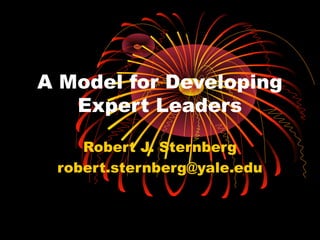
Developing Expert Leaders with Wisdom, Intelligence, Creativity, and Synthesis (WICS
- 1. A Model for Developing Expert Leaders Robert J. Sternberg robert.sternberg@yale.edu
- 2. Acknowledgments • Collaborators: The PACE Center at Yale and external collaborators, especially at USMA West Point • Funding agencies: Army Research Institute, Institute of Educational Sciences, National Science Foundation
- 3. Goal: To Develop Expert Leaders Criitcal message: The ends to which leaders apply their knowledge and the thinking processes that act on it, matter!
- 4. Components of Leadership Expertise • WICS • Wisdom* • Intelligence • Creativity • Synthesized • *Focus of today’s presentation
- 5. Why WICS? • You need CREATIVE skills to come up with ideas • You need ANALYTICAL skills to decide whether ideas are good ideas • You need PRACTICAL skills to make your ideas functional and to convince others of the value of your ideas • You need WISDOM to balance the effects of ideas on yourself, others, and institutions in both the short and long terms
- 6. Key Creative Decisions • Redefine problems • Analyze solutions • Sell solutions • Realize the limitations of knowledge • Take sensible, principled risks • Overcome obstacles
- 7. Key Creative Decisions • Attain self-efficacy • Be courageous • Maintain a perspective on oneself • Tolerate ambiguity • Allow time for creativity • Defy the crowd
- 8. Successful Intelligence • Ability to attain one’s goals in live, within one’s sociocultural context • By capitalizing on strengths and correction or compensating for weaknesses • By adapting to, shaping, and selecting environments
- 9. Successful Intelligence • Through a synthesis of analytical, creative, and practical abilities
- 10. Properties of Practical Intelligence • Tacit knowledge: What you need to know that it not explicitly taught and that usually is not even verbalized • The role of tacit knowledge • Measuring tacit knowledge • Developing tacit knowledge
- 11. Key Findings regarding Practical Intelligence • Experience matters, but what really matters is how much one learns from it • Not much related to IQ or g • Not much related to personality or cognitive styles • Predicts managerial performance
- 12. Key Findings regarding Practical Intelligence • Experience matters, but what really matters is how much one learns from it • Not much related to IQ or g • Not much related to personality or cognitive styles
- 13. Key Findings regarding Practical Intelligence • Predicts managerial performance singly and incrementally • Differs somewhat for management versus leadership • Can be developed
- 14. Why Smart Leaders can be so “Dumb” • The “what me worry” fallacy • The egocentrism fallacy • The omniscience fallacy • The omnipotence fallacy • The invulnerability fallacy
- 15. Is Intelligence Really Enough for Leadership? The Machado Question The Answer: The Flynn Effect Lessons from The Tragedy of the Commons
- 16. Why Intelligence is not Enough Leaders can be: • Creatively intelligent (e.g., in generating novel, strategic targets for terrorist attacks) • Analytically intelligent (e.g., in assessing the advantages and disadvantages of those targets) • Practically intelligent (e.g., in delivering the attacks to those targets) without being wise!
- 17. Why Wisdom is Especially Important in Current Times Humans have made enormous strides in technology, including destructive technology, without corresponding advances in their wisdom with regard to the uses of this technology (and perhaps with regard to anything else either) This mismatch between the development of technology and the lack of development of wisdom places the world at enormous risk!
- 18. Wisdom Means • Knowing what you know • Knowing what you do not know • Knowing what you can know (at a given time and place) • Knowing what you cannot know (at a given time and place)
- 19. Is Wisdom Universal? Fundamental values (not necessarily beliefs) appear to be largely the same across the world’s great religions and ethical systems, for example, in their stressing, in relations with others: 1. Reciprocity (the Golden Rule) 2. Sincerity 3. Honesty 4. Integrity 5. Compassion
- 20. The Balance Theory of Wisdom Wisdom is 1) The application of successful intelligence 2) Toward the attainment of a common good 3) Through a balance among intrapersonal, interpersonal, and extrapersonal interests
- 21. The Balance Theory of Wisdom 4) Over the short term, and long terms 5) Through the mediation of values 6) By acting so as to balance adaptation to, shaping, and selection of environments
- 22. Successful Intelligence Common Good G O A L Adaptation Extrapersonal SelectionShaping Balance of Interests Intrapersonal Interpersonal Balance of responses to environmental context V A L U E S Wisdom as Balance
- 23. The Problem with Proverbs 1. They sometimes contradict each other (e.g., “Out of sight, out of mind” and “Absence makes the heart grow fonder”) 2. They sometimes are plain wrong (e.g., “Spare the rod, spoil the child”) 3. The lessons they teach are often a matter of interpretation (e.g., “All’s well that ends well”)
- 24. Conclusions • WICS provides a useful model for leadership. It begins with wisdom. Without wisdom, there is no expert leadership. Wisdom can and should be developed.
- 25. I’m happy to hear from you! • Robert J. Sternberg • Robert.sternberg@yale.edu • www.yale.edu/pace
